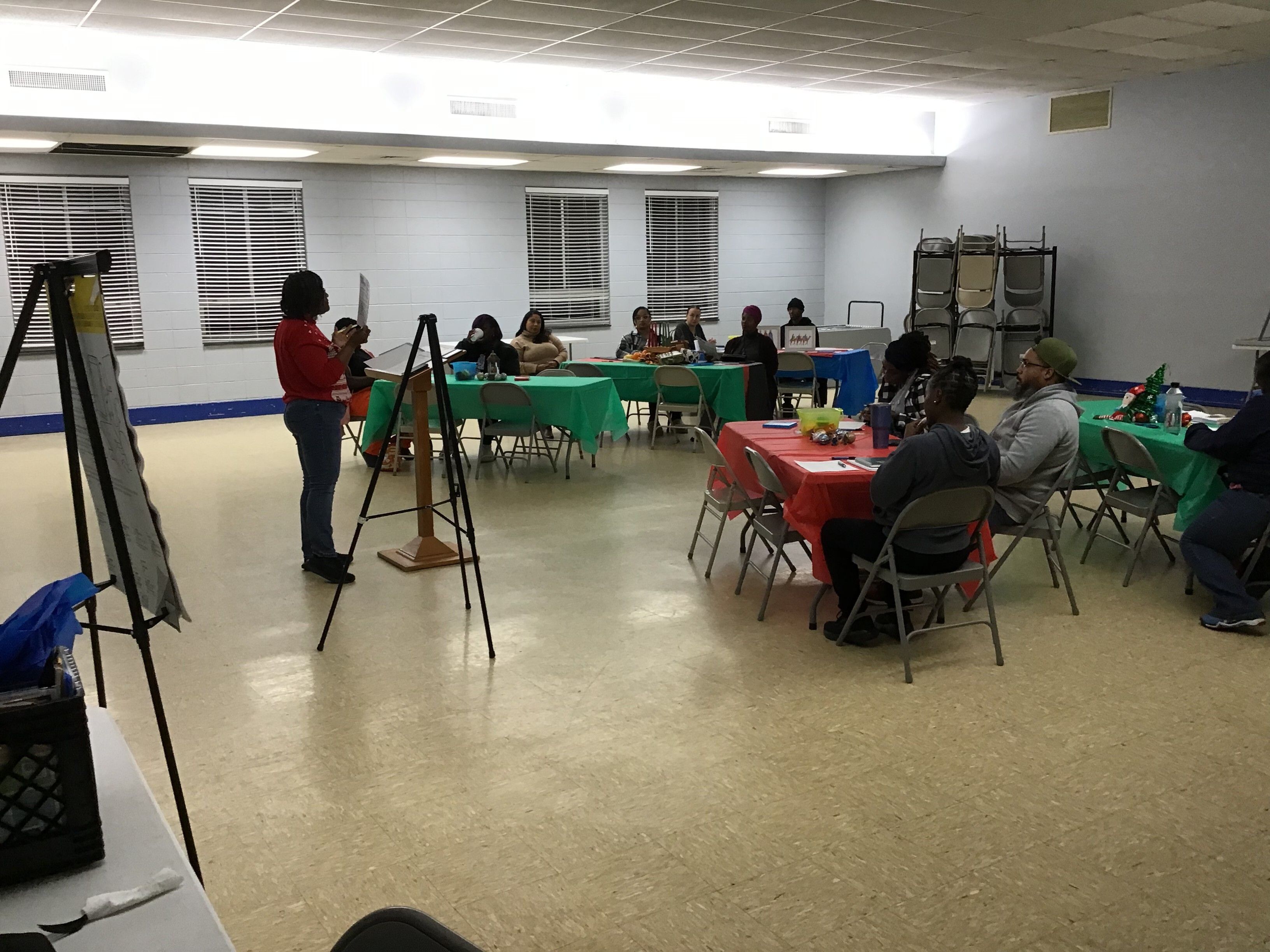
On December 12th, Operation Xcel families joined staff from Alcohol & Drug Services (ADS), Operation Xcel’s Executive Director (Charlene Gladney), the Family Engagement Coordinator (Lori Walton), the Website & Digital Media Specialist (Cana Pinchback), the Journalist (Valerie Jones-Robinson) and a few Operation Xcel volunteers at the Oak Springs Recreation Center for Parent Engagement in the Parent Café.
The purpose of parent engagement at Operation Xcel, as described by Ms. Walton, "is primarily targeting needs, offering advocacy, and building positive, goal-oriented relationships with families. Through a combined commitment from our partnerships with schools, we hope to foster meaningful relationships with families based on respect and empathy. Student achievement and overall well-being are at the core of our OPeXCEptionaL Family Project".
December’s Parent Café aimed to engage parents in conversation among themselves, which was facilitated by ADS staff and volunteers. ADS provided a full-course dinner to eliminate the distraction of late arrivals because parents needed to feed their children before attending the event. Instead, parents brought their children along and enjoyed dinner at the facility. Lori Walton, the Family Engagement Coordinator, kicked off the engagement period with an original poem she wrote during the dinner portion of the event. The poem resonated so much with the parents that when asked what they would take away at the end of the night, one father restated the name of her poem, I Will Sit Down When I Feel Like It. We plan to post the poem on our website in the coming weeks. As the program progressed, parents were encouraged to participate in a facilitated discussion about issues common to parents of school-age children. While the parents caucused in one room, volunteers oversaw the activity/task room for the children, helping them to make Christmas ornaments, frost cookies, and other fun activities while allowing the parents to focus on the reason for their attendance at the Parent Café.
The parents participated in a table talk discussing tips from the five Strengthening Families™ Protective Factors. Strengthening Families is a research-informed approach to increase family strengths, enhance child development, and reduce the likelihood of child abuse and neglect. It is based on engaging families, programs, and communities in building five key Protective Factors. The Five Protective Factors are qualities that were discovered by the Center for the Study of Social Policy and the Strengthening Families initiative. Strengthening Families™ is an evidence-based initiative aimed at empowering families and fostering healthy child development while reducing the risk of child abuse and neglect. This approach emphasizes the importance of active engagement among families, community programs, and local organizations. By cultivating five essential protective factors—such as strong parental resilience, social connections, and knowledge of child development—Strengthening Families™ works to create a supportive environment that nurtures children and strengthens family bonds. This initiative seeks to build a foundation for long-term family well-being and community resilience through collaboration and shared resources.
These are the five protective factors:
1. Parental Resilience refers to the ability of parents to exhibit strength and flexibility in managing life's stresses and to recover from adversity. It highlights the importance of mental and emotional well-being, enabling parents to be present in the present situation while working towards long-term solutions rather than merely reacting to each challenge as it arises.
2. Social Connections emphasize the importance of relationships, underscoring the need for parents to have positive, trusted friends within their community. These relationships serve as a support system, demonstrating practical ways to address family and community issues while meeting parents' practical and emotional needs.
3. Knowledge of Parenting and Child Development reflects that being a great parent can be both an innate ability and a learned skill. Parenting is a continuous learning process. Knowledge about typical child development helps parents maintain reasonable expectations for their children.
4. Social and Emotional Competence of Children suggests that parents should help children learn to manage their emotions, express their needs and feelings, resolve conflicts, and interact positively with others. Parenting can become less stressful by teaching children to communicate their needs effectively.
5. Concrete Support in Times of Need indicates that families who remain strong and healthy ask for help when necessary.
Mrs. Gladney led the group discussion by presenting each factor individually and defining what each represents. Guided discussion cards were placed at each table, and ADS volunteers facilitated the parent discussions to keep them moving within the allotted time frames. The parents read the questions on their cards, and the group selected one question to respond to. They then used guided discussion cards to share how they effectively incorporated tips from each factor or how they planned to do so based on the information provided in the presentation.
Midway through the parents' engagement portion of the session, I observed a couple of discussions at tables where parents and grandparents responsible for raising children participating in the Operation Homework afterschool program hosted by Operation Xcel were gathered. Some parents shared their expectations based on their upbringing, while others expressed that they intentionally chose not to raise their children like they were raised. I found it interesting that despite these differing approaches to parenting, the participants were receptive and open to listening to each other's ideas without judgment.
At the end of the parent engagement session, Mrs. Gladney asked each table to describe their discussion of the Five Protective Factors in one word. Surprisingly, five tables of parents corresponded to the five protective factors. The words the parents used to describe their experience were “listen,” “enlightened,” “relief,” “knowledge,” and “tired.”
My key takeaway from the Parents’ Engagement Night came from my participation in the discussions at the last table, particularly regarding Protective Factor #5—Concrete Support in Times of Need. After listening to the other mothers, I realized I needed to be a more supportive grandmother. In addition to being available when my grandchildren need help, I should offer advice when asked. I committed to seeking guidance from the most reliable source of wisdom I know, which is God. I will then present them with choices and allow them to choose what works best for them rather than imposing my desires on my grandchildren. I wrote down this commitment on another card that was on the table entitled I WILL…
I am grateful for Operation Xcel and all it provides for its students, parents, and even the staff who get to attend as a work assignment. Yet, we still benefit from its phenomenal approach to family enrichment!

